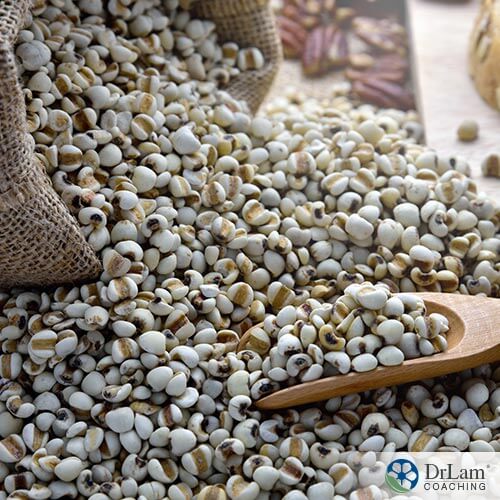 Adjusting your diet for better health is an ongoing process. This is because medical experts and researchers are always finding new things that can improve your health and help with various disorders and health problems. Millet isn’t a new product. In fact, it’s a really old one with a history that goes back more than 7,000 years. And yet, the modern world is just starting to understand the health benefits this grain can offer. It contains a number of vitamins and nutrients that are essential for normal functioning. This is important because of the increasing rate of deficiencies in the modern diet. Millet can help lower your blood pressure, improve gut health, and lessen the symptoms of disorders such as Adrenal Fatigue Syndrome (AFS). So, there really are a number of excellent reasons why you should add this grain to your diet.
Adjusting your diet for better health is an ongoing process. This is because medical experts and researchers are always finding new things that can improve your health and help with various disorders and health problems. Millet isn’t a new product. In fact, it’s a really old one with a history that goes back more than 7,000 years. And yet, the modern world is just starting to understand the health benefits this grain can offer. It contains a number of vitamins and nutrients that are essential for normal functioning. This is important because of the increasing rate of deficiencies in the modern diet. Millet can help lower your blood pressure, improve gut health, and lessen the symptoms of disorders such as Adrenal Fatigue Syndrome (AFS). So, there really are a number of excellent reasons why you should add this grain to your diet.
Millet is most often thought about in relation to bird food, but this is an underestimation of the value of this food. It’s technically a seed, but is most often classified as a whole grain, and grows well in warm climates. Millet has been grown and eaten for thousands of years throughout the world. Today, you can cook and use it in a variety of forms and ways and it can be used to replace just about any other whole grain. It’s most often yellow, but can be white or brown and looks a bit like mustard seeds. It has a subtly sweet flavor and the texture can vary depending on how it’s cooked. As an added benefit, millet is usually cheaper than any other grains, so it makes a good substitute if you’re trying to eat well on a budget.
Millet can usually be found in good health food stores in the same section as other whole grains, nuts, and seeds. When buying it, make sure that it doesn’t smell musty or stale, this means it’s probably been kept for too long. It should smell nutty. It can be bought in whole or hulled form, but it’s usually best to buy your millet in the hulled form as the outer seed includes an indigestible layer that has to be removed before it can be eaten. This is extremely difficult to do on your own, so it’s best if you buy it in the hulled form so it’s ready to cook and eat. It can be cooked until fluffy and eaten in salads, used as a replacement for other grains, or made into porridge. Basically, whatever you usually do with other grains, you can do with millet as well, and this versatility is one of its biggest advantages.
You will enjoy a number of health benefits when you add this whole grain to your diet. The most important health benefits of millet include
AFS is a troubling and potentially dangerous disorder that can occur as a result of long periods of stress. Your body has a system called the NeuroEndoMetabolic (NEM) Stress Response which makes changes in the body in response to stress. An important component of this system is your adrenal glands, which secrete hormones that are essential for coping with stress and in everyday functioning. The NEM stress response is designed to be active for short periods, to deal with transitory causes of stress such as an animal attack. However, the modern lifestyle contains many sources of ongoing stress that can cause this system to become overworked. When this occurs, the adrenal glands become fatigued and struggle to keep up with the demand for hormones, resulting in the degradation of several systems and AFS. This causes a variety of troubling and confusing symptoms such as fatigue, brain fog, mood disorders, digestive problems, hypoglycemia, and weight gain.
 Unfortunately, because AFS isn’t accepted by most of the medical establishment, it may be difficult to get the AFS recovery advice you need if you suffer from this disorder. This can result in a frustrating series of doctors’ visits during which you get sicker despite receiving test results that are relatively normal. If you find yourself in this cycle, it’s important that you do your research and consider AFS as a potential cause for your ill health so you can start your journey to recovery as soon as possible.
Unfortunately, because AFS isn’t accepted by most of the medical establishment, it may be difficult to get the AFS recovery advice you need if you suffer from this disorder. This can result in a frustrating series of doctors’ visits during which you get sicker despite receiving test results that are relatively normal. If you find yourself in this cycle, it’s important that you do your research and consider AFS as a potential cause for your ill health so you can start your journey to recovery as soon as possible.
Although your adrenal glands are an integral part of your NEM stress response, they aren’t alone. The stress response consists of a number of organs and systems that are linked together to create a functional network. The two main systems that respond to stress are the neuroendocrine and the metabolic systems. These systems work continuously, but also increase their output in response to stress or health assaults. The metabolic system includes the liver, pancreas, immune, microbiome, and the extracellular matrix. These systems help with inflammation, metabolism, and detoxification.
When the body is under prolonged stress, it usually results in major problems with the metabolic system before any other. Thyroid function slows, which slows the metabolism and causes inexplicable weight gain. The pancreas too is affected, which can play havoc with blood sugar levels. The pancreas is the regulator of glucose, the fuel for every system in the body, so it isn’t surprising that problems in this area can cause such widespread health issues and symptoms. The liver too is affected by the metabolic breakdown, slowing its detoxification and elimination efforts. This can result in a buildup of toxins that can permeate cell walls and cause extensive damage.
Metabolism is the chemical process by which food is converted into energy to allow the body to live, grow, and heal injury. But your metabolism does much more than that. It also governs inflammation responses and helps the body to detoxify itself. If your system is healthy, your metabolism will help to guard you against the damaging effects of stress, and provide the brain and individual cells with the energy they need to heal any damage and function on a day to day basis. But when this system becomes dysregulated because of AFS, it can cause a variety of problems and health concerns. The signs of metabolic problems because of AFS include
Unfortunately, many people ignore or overlook the first signs of problems with the metabolic system. These symptoms tend to be fairly mild at first and are easily attributed to other causes. This can cause further stress to the system and result in even more damage as well as a longer recovery period. This can lead to a variety of problems including the following:

The exact physical mechanisms that cause these symptoms of derangement aren’t yet fully understood. However, what is clear is the fact that your metabolism can be severely and negatively affected by your body’s inability to cope with the effects of prolonged stress and adrenal fatigue. That’s why you need to take steps to support your metabolic health as soon as you notice ongoing or reoccurring problems with these processes.
The key to recovery from AFS and its associated metabolic problems is to reduce stress and support the body by making lifestyle changes that allow the body to heal itself and return to normal functioning. Diet is particularly important if you suffer from metabolic symptoms and making changes in this area should be one of the first measures you take if you believe you have AFS. Because the metabolic system is usually the first to become affected and to show symptoms, problems with this system are an early warning sign that something more serious is going on with your body.
 The goal of this kind of diet is to give the body the nutrients it needs to heal, and to reduce the amount of foods you eat that could be contributing to your stress load. This means eating foods that are natural and unprocessed as well as nutritionally balanced. The best diet for AFS recovery is based on vegetables, with 30-40 percent of what you eat from this food group. Lean proteins should make up 20-30 percent of your diet with around the same amount of healthy fats. Whole grains, legumes, fruits, and beans should make up the rest of what you eat and this is where millet can come in. Millet is a healthy and natural whole grain that will not only suit your new eating regime, it will support your health and your metabolic system in a number of ways.
The goal of this kind of diet is to give the body the nutrients it needs to heal, and to reduce the amount of foods you eat that could be contributing to your stress load. This means eating foods that are natural and unprocessed as well as nutritionally balanced. The best diet for AFS recovery is based on vegetables, with 30-40 percent of what you eat from this food group. Lean proteins should make up 20-30 percent of your diet with around the same amount of healthy fats. Whole grains, legumes, fruits, and beans should make up the rest of what you eat and this is where millet can come in. Millet is a healthy and natural whole grain that will not only suit your new eating regime, it will support your health and your metabolic system in a number of ways.
When you’re making changes to your diet to support your body and recover from AFS, millet can be a very beneficial grain to add to your diet. It contains vitamins and minerals that can help correct deficiencies and support your body in its natural functions and in its healing. In addition, the natural fiber in this grain can improve elimination, which will help support the functioning of your liver and kidneys, and boost your immune health as an added benefit. These effects are particularly important with AFS because the early stages of this disorder often involve dysregulation of the metabolic system, which results in constipation or other digestive difficulties.
Millet can also improve your metabolic health in other ways. The magnesium in millet can increase the efficiency of insulin and glucose receptors in the body. This can help to stabilize blood sugar levels and prevent type 2 diabetes. It will also help to keep your blood glucose levels more stable, providing the fuel that every system and organ in your body needs to function correctly.

If you’re trying to eat well to support your body in its fight against stress and AFS, then millet could be a good addition to your diet. This grain is high in a number of vitamins and minerals that can help treat a variety of health problems and symptoms as well as support your overall health. Although it can help to lower your blood pressure and provide your body with much needed nutrition, it’s most helpful in treating digestive or metabolic problems. This benefit is what makes it so valuable in treating some of the symptoms associated with AFS and related disorders. So, if you have problems with your metabolic symptoms because of AFS, this whole grain might be the solution you need. Try adding some millet to your diet and track the effects to see if it makes a difference to your condition and metabolic health.
© Copyright 2018 Michael Lam, M.D. All Rights Reserved.
Millet contains vitamins and minerals that are essential for good health and well-being. It can help treat high blood pressure, stabilize blood sugar levels, and improve gut health. This final health benefit is the most valuable as it will lessen digestive symptoms associated with AFS.

